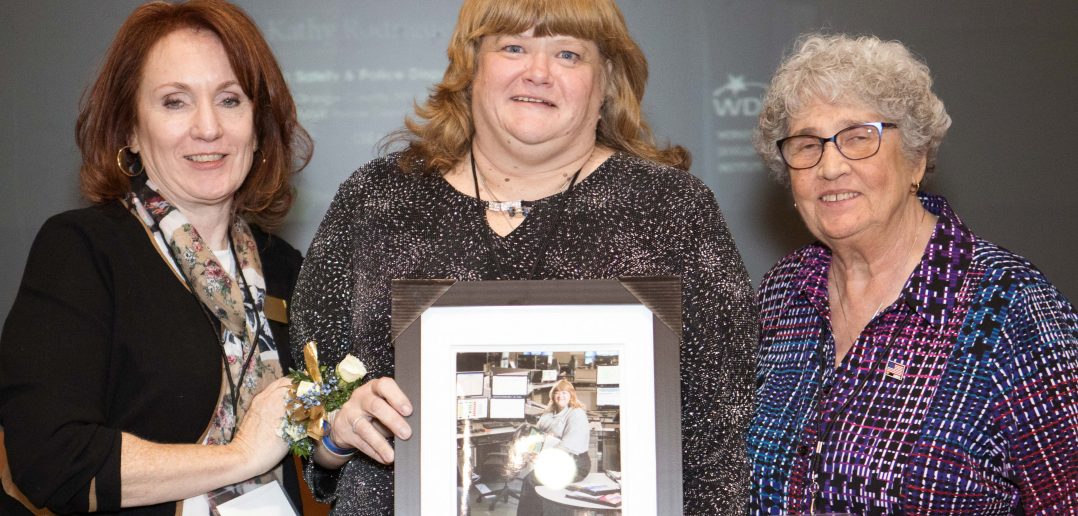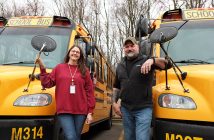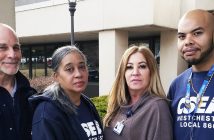GOSHEN — Even when juggling work and family responsibilities, there’s still a place for you in our union.
Just ask CSEA Orange County Local Secretary Kathy Rodriguez.
As a single mother working as a police dispatcher years ago, Rodriguez became a CSEA activist and eventually served as Town of Wallkill Unit president.
Even with other responsibilities, Rodriguez made CSEA activism a priority.
“As a working mother, I knew my union was important,” said Rodriguez. “If I had to take the day off because my daughter was sick, I was able to do that because I had a union and a contract. When there was a union meeting or a rally, I brought my daughter along. She has an understanding now of what labor has done for our country, which so many in her generation are missing.”
It’s that history of dedication that earned Rodriguez a spot in the Workforce Development Institute’s 2018 Women Working Calendar. Each year, the calendar highlights the contributions of female labor activists from across the state.
Dedication behind the scenes
The 2018 calendar includes a portrait of Rodriguez, who was photographed inside the expansive dispatch center at the Orange County Emergency Services Building, where she works as a public safety dispatcher.
While law enforcement has long been a male-dominated career, women have a history of working behind the scenes answering emergency calls, dispatching first responders, and helping keep officers on the street safe by keeping in regular contact via radio.
“We have female officers now, but it used to be that if you worked in law enforcement, you were a dispatcher or the police chief’s secretary,” Rodriguez said. “At my first job, a department outside Orange County, my uniform included a miniskirt. Things have changed a lot since then.”
Even though dispatchers such as Rodriguez aren’t physically on the scene of a call, they play a critical and often stressful role.
“The technology and resources we have now allow us to help so much more on our end,” Rodriguez said. “We have programs that allow us to talk people through many types of emergencies. I can talk you through childbirth, I can talk you through CPR and I can get you to open up someone’s airway if they’re choking. I’m proud of the work we do as dispatchers.”
Continued unionism
With her daughter now grown, Rodriguez has maintained her union activism. On top of also dispatching part-time for the Town of Wallkill, on top of her day job, Rodriguez serves as local secretary, 1st vice president of the Orange County Unit, and a member of several Southern Region committees.
She’s also recording secretary for the Hudson-Catskill Central Labor Council, something she became involved years ago at the urging of late Southern Region President Diane Hewitt.
“I went to a meeting and learned that other unions have a lot of the same challenges we do,” Rodriguez said. “We gain so much from working together. We may not agree on every issue, but when you’re sitting next to each other, you can learn a lot and build stronger relationships within labor.”
CSEA Executive Vice President Mary E. Sullivan, who serves as president of the Capital District Area Labor Federation, was present to cheer Rodriguez on during a celebration of the 2018 Working Women honorees.
“Kathy is dedicated to helping improve the lives of working families across our state,” Sullivan said. “She goes the extra mile every day to protect her community and serve our union. CSEA women like Kathy Rodriguez are at the very heart of why we shall never quit building our union stronger than ever.”
To learn more, visit wdiny.org.
— Jessica Ladlee
When calling 911, be prepared
Don’t assume 911 operators have all the information they need as soon as you call for help, said Orange County Local Secretary Kathy Rodriguez.
While law enforcement has benefited from tremendous technology upgrades in recent years, Hollywood portrayals on television shows such as “CSI” or “NCIS” are not the reality for the average CSEA member working as a public safety dispatcher.
“A dispatcher is going to verify your phone number, your name, and the location and type of your emergency,” Rodriguez said. “All of this is important in order to get help to you quickly.”
Those questions might seem frustrating in the midst of an emergency, but they’re necessary. Here’s why:
- With landline phones, dispatchers usually receive an exact address, but cell phone calls rely on GPS and nearby cell towers to pinpoint a general — but not exact — location.
- A name and phone number allow the dispatcher to call you back if you lose your connection.
- The more information a caller provides about the nature of the emergency allows 911 operators to determine which first responders must be dispatched to the scene.
With many families now only keeping cell phones at home, it’s important that children know how to call 911 in case of an emergency, Rodriguez said.
Children should learn their home address (and apartment number, if applicable), their first and last name (and their parents’), and what types of situations warrant a call for help. Whether it’s a landline or cell phone, keep a phone accessible and unlocked for emergency use.



